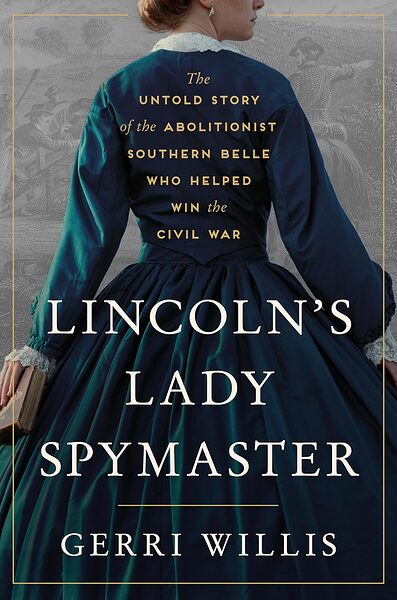Looking for a good read? Here is a recommendation. I have an unusual approach to reviewing books. I review books I feel merit a review. Each review is an opportunity to recommend a book. If I do not think a book is worth reading, I find another book to review. You do not have to agree with everything every author has written (I do not), but the fiction I review is entertaining (and often thought-provoking) and the non-fiction contain ideas worth reading.
Book Review
The Belle Was A Spy
Reviewed by Mark Lardas
June 15, 2025
“Lincoln’s Lady Spymaster: The Untold Story of the Abolitionist Southern Belle Who Helped Win the Civil War,” by Gerri Willis, Harper, June 3, 2025, 288 pages, $28.99 (Hardcover), $14.99 (E-book), $24.29 (Audiobook), $45.95 (Audio CD)
Elizabeth Van Lew, a southern belle, was born and raised in Richmond, Virginia. Wealthy, well-connected, attractive, charming, she was utterly opposed to slavery. When Virginia seceeded, she supported the Union. Burying outward signs of that support, she provided secret support; helping Union POWs escape to the North, and eventually spying.
“Lincoln’s Lady Spymaster: The Untold Story of the Abolitionist Southern Belle Who Helped Win the Civil War,” by Gerri Willis, tells her story, and the story of the escape and espionage ring she ran from Richmond.
The book is a biography of Van Lew, with a focus on her service to the Union during the Civil War. Willis tells of Van Lew’s family and upbringing, putting her support for abolition in context. It shows how her family acquired its wealth, and explains her status in the antebellum South.
The heart of the book explores Van Lew’s support for the Union during the Civil War. It started small; providing succor to Northern soldiers held prisoners of war in Richmond. There was no Geneva Convention yet, and the South treated POWs shabbily.
Eventually it grew into active measures. Willis shows how Van Lew built a line to move escaping Union POWs safely to the north. Later, Van Lew began gathering military and political intelligence about the Confederacy, sending it to Washington. She even infiltrated a spy into Jefferson Davis’s household, lending Varna Davis a Van Lew family house slave as a domestic. The slave, Mary Bowser, was literate and eager to help the Northern cause.
Willis shows much of Van Lew’s success was due to Confederate society’s propensity to underestimate the abilities of both women and slaves. Van Lew and her associates pulled off deeds that would have aroused suspicion if done by white men.
Willis fills the book with colorful characters who played roles in the Civil War. Besides Bowser, these include assassin John Wilkes Booth, Southern spy Rose Greenhow, and prison escaper Thomas Rose.
The book lacks a happy ending. In her later years Van Lew was abandoned by Washington DC. She was shunned by Richmond neighbors for supporting the North. She became impoverished, known late in life as “Crazy Bet.”
Regardless, “Lincoln’s Lady Spymaster” tells a powerful story. It shows what one determined person can accomplish through force of will and determination. It reminds readers how far the US has progressed in racial equality and women’s rights in 160 years.
Mark Lardas, an engineer, freelance writer, historian, and model-maker, lives in League City. His website is marklardas.com.
